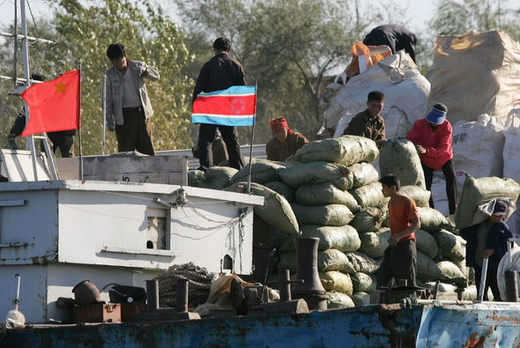 |
|
North Koreans load freight onto a barge heading for China at a port in Sinuiju on the Aprok River (Yalu River) on October 11. AP Yonhap
|
Experts predict a food shortage of more than 500,000 tons next spring
North Koreans are expected to suffer a food shortage early next year unless the current diplomatic stalemate resulting from the communist country’s reported nuclear test is not resolved. This concern is based on ongoing efforts in the international community to impose sanctions on Pyongyang in retaliation for its unexpected nuclear activity, with no sign of South Korea resuming its shipments of food aid to the North. According to experts’ estimates, the North needs an annual 6.5 million tons of food, including rice, barley, corn, and potatoes, to nourish its impoverished people. It needs a bare minimum of 5.5 million tons per year for its citizens to survive. However, even during bumper crop years, the North has produced a maximum of 4.5 million tons of food, with the rest being supplied via outside humanitarian aid. But in the wake of Pyongyang’s missile test on July 5, South Korea decided to suspend food aid amounting to 500,000 tons of rice until a diplomatic breakthrough was made. But as the North quickly exacerbated the situation by going ahead with what it declared on October 9 to be a nuclear test, it will be even more difficult to see a resumption of the stalled food donations. Though the South sent 89,500 tons of rice to help the communist country recover from flooding this summer, this amount is far short of making up for the anticipated shortage. China is not a sure bet for food donations, either, as relations between the North and its former ally have chilled considerably. The World Food Programme, a U.N. food agency, has also decided to scale down on its food aid to the North. All these moves suggest that the North will be short of at least 500,000 tons of food to feed its citizens next year, even if it sees a good yield in this fall’s harvest - an event which experts see as highly unlikely. "North Korea’s harvest this year will not be better than last year’s, considering the flooding [this summer]," a government official said. "During the harvest season, things will not get much worse, but the [food shortage] will reach its hardest point next spring."





